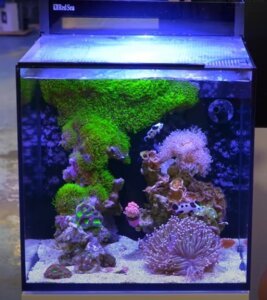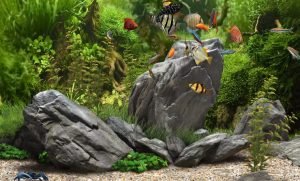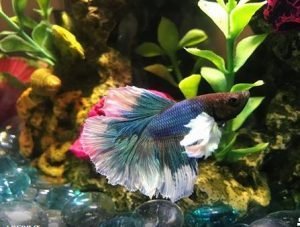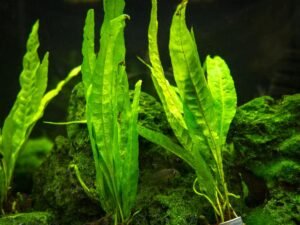Our team at Aquariumhunter.com have researched all aspects of fish keeping and, together with their own fish keeping experiences, have provided articles on all aspects of the hobby. Many of the Aquarium Info and Tips articles were written in response to viewer questions.
Almost all hobbies will cost you money. Very few give back the way pet fish do. Ask any aquarist and they will vouch that nothing beats sitting back in their favorite recliner and viewing the fish swim around the stunning aquascape that they personally created.
Below this quick guide for beginners we list some of our better ‘Info and Tips’ articles. Scroll down to take a look.
Aquarium Info and Tips for New Fish Hobbyists

If you are brand new to the hobby of keeping fish, then you’ll find the following tips beneficial. They may save you time, money, and heartache.
Do Your Research
The best advice we can give is to do research before buying anything. Avoid jumping into this hobby before spending time understanding what aquatic creatures you wish to care for and what type of tank or pond will best suit them.
Start with easier to keep species, then as you learn and your confidence grows, you can venture into the more delicate species. For example, keeping a marine fish aquarium comes with many more challenges than a freshwater setup.
Keeping goldfish and guppies are a great way to be introduced into the hobby. It wouldn’t be a good idea to race off and buy expensive and delicate fish species such as discus fish. It will only end in disappointment.
Fishkeeping is a constant learning curb. Even the most experienced are continuously learning new things.
Be patient and take your time. You will be rewarded with a beautiful aquarium set up in your home.
What’s Your Budget Like?
Once you have decided on what type of tank you desire, the next step is to work out how much money you can afford to spend to keep your aquarium running properly.
Buy decent equipment, but don’t overspend to start with. Start with the largest setup you can afford allowing for the running costs. Fish will always do better in larger tanks.
Smaller tanks require regular water changes and maintenance. This can cause the hobby to become more of a chore, taking away the enjoyment.
Avoid overstocking your new tank. There is a limit to the number of fish a certain sized tank can take. Start with the hardier less expensive species of fish. This will avoid disappointment with fish losses.
Be Patient
All new fish tanks require time for the tank to ‘cycle’. Once you have set up your aquarium with gravel, rocks and water, let it sit with filters running for at least a week before introducing your first fish. This allows chemicals such as chlorine to dissipate and for beneficial bacteria to begin to colonize the tank. The nitrogen levels will have large fluctuations during the first weeks.
Once these have been ironed out then your tank will be ready for the introduction of fish.
Overstocking will cause excessive wastes to build up in the water. As a result, ammonia levels will spike, affecting fish health. Harder fish species will be able to tolerate ammonia spikes better than sensitive fish.
Overfeeding and poor filtration will also lead to ammonia spikes. Test the water frequently to check that ammonia levels are within the acceptable limits. Do not add any new fish to the tank if these levels are too high. It will only compound the problem.
A one third water change will bring down ammonia levels. Maintaining water parameters will enhance the chances of running a successful, and healthy fish aquarium.
Regular and Proper Maintenance
This is the most important part of keeping a healthy aquarium. The more effort and time you put into setting up a maintenance schedule early in the establishment of your aquarium, the less you’ll spend later.
The core areas of maintenance include:
- Checking water parameters. The aquarium will constantly be evaporating. As water evaporates the density of salts in the water will increase. Also, keep abreast of water PH and ammonia levels.
- Regular water changes. Smaller tanks, and tanks with many fish for its size, will require a greater number of water changes. For a fish in a bowl, water will need to be changed daily, small tanks weekly and very large tanks periodically. Generally, switch out about one third of the water.
- Cleaning rocks, gravel and glass. Wastes build up in the tank. These can be suctioned out to keep the appearance looking good and it will be better for fish health. Algae will form on the glass and rocks, especially if there are excess nutrients in the water. Excess nutrients will result from over feeding and fish wastes.
- Check heaters, pumps and filters are working correctly.
Fish Compatibility
Not all fish will get along with each other. Understand which fish will go together before spending money buying them.
Larger more aggressive fish will eat smaller fish. Some fish, like tiger barbs, are known for nipping the delicate fins of guppies.
Certain species will be shy and evasive in a mixed community tank. If they have no where to hide, they will stress, causing losses.
Be aware of the different species water parameters. Some aquarium fish are better suited to brackish water, whilst others won’t tolerate any salt. Some species are adapted to survive in cold water, whilst others will be solely tropical species requiring warm water to survive.
Fish such as carp like eating and digging up plants. Species of fish like loaches will eat your baby snails.
With marine aquarium setups, understand which fish species are compatible with the different corals and anemones in the tank.
Closing Thoughts
To see your aquarium or pond ecosystem thrive is a very rewarding feeling. What you put in in the beginning with this hobby will reward you many times over. Take your time, do your research, set up with the right equipment and read the many aquarium info and tips articles we have provided.
Best Info and Tips Article Snippets
 15 Best Nano Saltwater Fish For Your Nano Reef Tank
15 Best Nano Saltwater Fish For Your Nano Reef Tank
Starting your new aquarium hobby can be as easy as A-B-C if you follow the guidelines for proper fish maintenance. An aquarium is considered a “nano tank” when it can hold 30 liters of saltwater or less. Although an aquarium of this size looks easy to maintain, there is a little more to it. It starts with knowing which fish are best suited.
 How to Raise KH in Aquarium Water (Complete Guide)
How to Raise KH in Aquarium Water (Complete Guide)
In this article we explain KH (Carbonate Hardness) and its importance to the aquarium and we show how to Raise KH in Aquarium water. We also address GH and pH as all these water measurements are interrelated.
 Best Plants for Betta Fish Tanks – Live and Artificial
Best Plants for Betta Fish Tanks – Live and Artificial
Betta fish (Siamese Fighting Fish) naturally live in heavily-vegetated, shallow water streams in Asia. When deciding how to set up your tank, there are so many plant options to choose from that could resemble their natural habitat. We have put together a list of the Best Plants for Betta Fish Tanks to give you more of an idea of what would suit your betta fish.
 60+ Betta Fish Names For All Types Of Bettas!
60+ Betta Fish Names For All Types Of Bettas!
Betta fish, also known as Siamese Fighting Fish, are great pets for beginner fish-keepers. They are clearly distinguished by their beautiful, long fins ranging from bright reds to deep blues. If you’re looking for some ideas to name your elegant fish, we’ve compiled a list of the Best Betta Fish Names that we could find to give you some inspiration.
 Female vs Male Bettas
Female vs Male Bettas
Betta fish are some of the most stunning tropical fish found at your local pet store. Their characteristics and physical features are an appealing catch for aquarium keepers, however differ greatly between the male and female fish. We’ve compiled everything you need to know about Female vs Male Betta Fish.
 How Many Glofish in a 10 Gallon Tank? Important Advice Guide
How Many Glofish in a 10 Gallon Tank? Important Advice Guide
Unlike anything else in the world of aquatic life in aquariums is the Glofish! They are magnificently colored, spectacular fish which have had a fluorescence gene added to their genome, resulting in fish that are permanently fluorescent. In this article we delve into the controversial question: How Many Glofish in a 10 Gallon Tank?
 Do Betta Fish Need Filters?
Do Betta Fish Need Filters?
Betta fish have the unique ability of surviving in waters with little oxygen because they can breathe oxygen directly from the air. Because of this, some hobbyists believe that they don’t need a filter. So, Do Betta Fish Need Filters? A filter does more than just aerate an aquarium, it also works to clear out toxins and debris from the tank. So ultimately yes, betta fish would benefit a lot from having a filter.
 How Many Glofish in a 5-gallon Tank? The Ideal Tank & Mates!
How Many Glofish in a 5-gallon Tank? The Ideal Tank & Mates!
It’s no surprise that the colorful Glofish catches your eye! Many new fish hobbyists are drawn to the fish that could potentially become a new addition to their aquarium. This article will help you determine how many glofish you can keep a 5-gallon tank. We explain the requirements for caring for glofish, tankmates and the different types of glofish available in pet fish stores.
 How Long Can Betta Fish Go Without Food?
How Long Can Betta Fish Go Without Food?
When in the right tank and living environment, betta fish are active, curious and entertaining fish, with colorful full fins. They can actually survive without food for a considerable amount of time. However, there are some things fish-keeper need to know.
 How to Breed Betta Fish (The Easy Way)
How to Breed Betta Fish (The Easy Way)
Betta fish are popular aquarium fish, and they are a favorite among novice and experienced aquarists alike. Breeding bettas can be a rewarding and enjoyable experience, as they are relatively easy to breed, and the results can be quite stunning. Use our simple guide to learn how to breed betta fish successfully.
 Top 12 Aggressive Cichlids (With Pictures)
Top 12 Aggressive Cichlids (With Pictures)
Aggressive Cichlids have often been unfairly labelled due to a lack of understanding about their behavior, care requirements, and compatible tank mates. In this article we provide a summary of a selection of popular aquarium cichlids considered to have an aggressive nature. Our hope is that we can shed some light on the least risky approach to keeping these interesting fish.
 7 Hardy Plants For a Brackish Water Aquarium
7 Hardy Plants For a Brackish Water Aquarium
If you’ve made the decision to change from freshwater to brackish water in your aquarium, selecting suitable plants can be a challenging task. To assist you in this process, we have compiled a list of some of the popular hardier varieties of plants for a brackish water aquarium.
 12 Aggressive Freshwater Fish for Your Tank: With Pictures
12 Aggressive Freshwater Fish for Your Tank: With Pictures
In this guide, we introduce you to some of the popular aggressive freshwater fish, exploring their special traits, tank set up, habitat, tankmates and appropriate care requirements. We’ll also help you with being able to decrease aggressive behaviours in community tanks.
